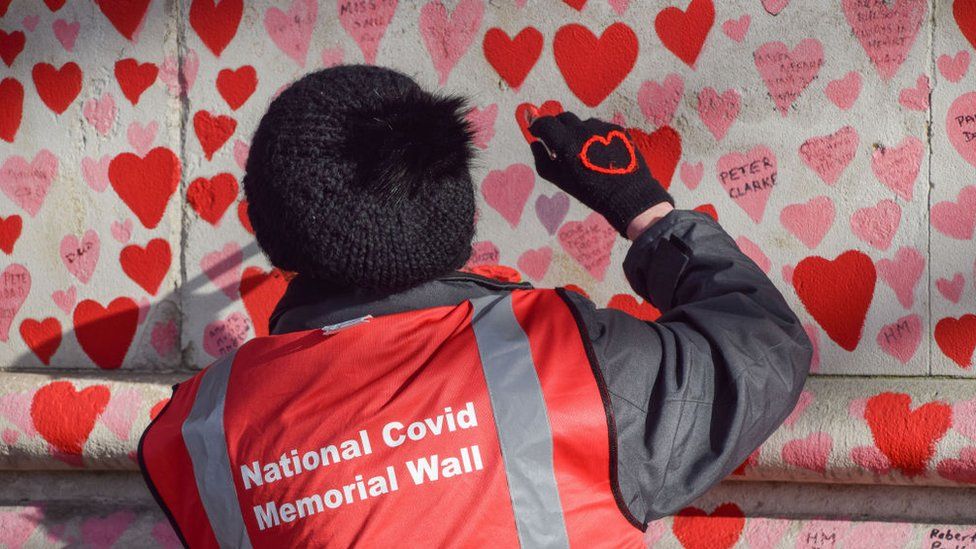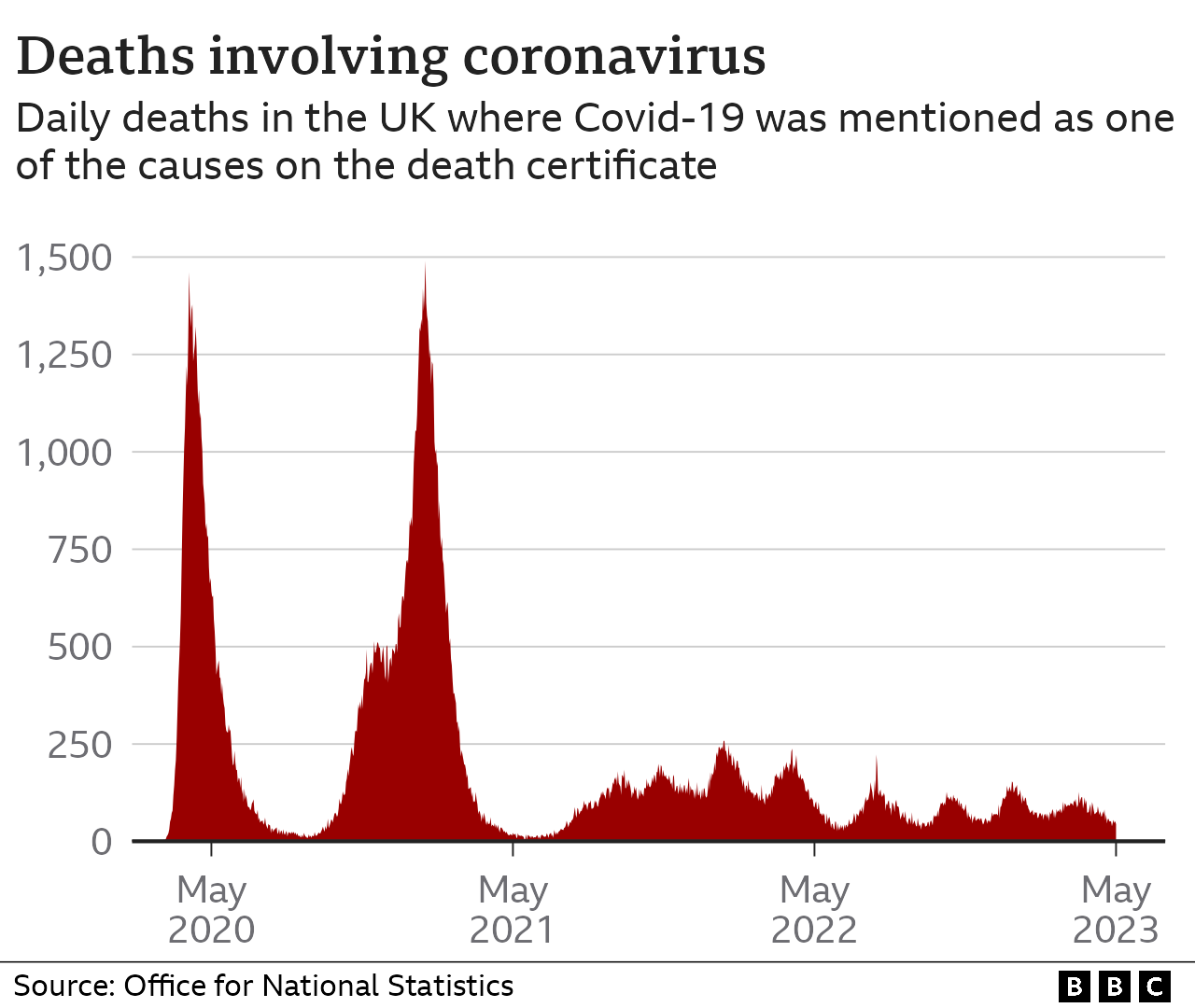The lead lawyer questions the approach taken, saying the impact of lockdowns had not been fully considered.
 Image source, Getty Images
Image source, Getty ImagesThe “potentially massive impact” of lockdowns on society was not thought through in 2020, the lead lawyer for the Covid inquiry has said.
As the probe into the government’s handling of the pandemic began hearing evidence, Hugo Keith KC said the UK may not have been well prepared “at all”.
It was “extraordinary” that lockdowns had received little thought, he added.
Government figures show 227,321 people have died in the UK with Covid mentioned on their death certificate.
Mr Keith told the first public hearing that the virus had caused “death, misery, and incalculable loss”.
He said while Covid could not have been avoided, the key issue was whether its impact on the UK was inevitable.
There was “very little debate” about whether a national lockdown could be needed ahead of the pandemic or whether it could be avoided, Mr Keith told the inquiry, adding that there was a failure to think through the consequences for education and the economy.
On Tuesday, Mr Keith was addressing the inquiry as it prepares to take oral evidence from its first witnesses later in the week.
Its first topic – or module – will examine how well prepared the UK was for Covid up to January 2020.
Mr Keith said: “Even at this stage, before hearing the evidence, it is apparent that we might not have been very well prepared at all.”
What is the UK Covid-19 inquiry?
- It is about going through what happened and learning lessons
- No-one will be found guilty or innocent
- Any recommendations made do not have to be adopted by governments
- The inquiry has no formal deadline but is due to hold public hearings until 2026
- Scotland is holding a separate inquiry in addition to the wider UK one
This video can not be played
To play this video you need to enable JavaScript in your browser.
Chair Baroness Hallett pledged that the inquiry into the handling of the coronavirus pandemic would be the “thorough investigation” that the public deserves.
The former High Court judge paid tribute to a “dignified vigil” of bereaved family members holding a silent protest outside of the building.
Lady Hallett said there were three key questions to be answered for the “millions of people who have suffered and continue to suffer”:
- Was the UK properly prepared for a pandemic?
- Was the response to it appropriate?
- And can we learn lessons for the future?
This first part of the inquiry will hear from key politicians, civil servants, scientists, unions, health and care organisations, groups representing victims and their relatives and more.
The Covid-19 Bereaved Families for Justice group has criticised the inquiry’s timetable and says people have been “excluded from sharing key evidence”.
They branded the inquiry’s Every Story Matters project – where members of the public can share their experience with the inquiry through a website – an “inadequate” process because stories will be anonymised and summarised and possibly “open to bias and interpretation by third parties”.
Addressing critics of the inquiry, Lady Hallett said she hoped they would understand the difficult balance she has had to strike.
“I am listening to them, their loss will be recognised, they will be able to contribute to the inquiry.”
Mr Keith, counsel to the inquiry, said UK was “taken by surprise” over “significant aspects” of the pandemic, including lockdowns.
“Extraordinary though it may seem, given that it’s a word that’s forever seared in the nation’s consciousness, there was very little debate pre-pandemic of whether a lockdown might prove to be necessary in the event of a runaway virus, let alone how a lockdown could be avoided.
“Very little thought was given to how, if it proved to be necessary, how something as complex, difficult and damaging as a national lockdown could be put in place at all.
“Equally, there appears to have been a failure to think through the potentially massive impact on education and on the economy.”
He said the UK had been preparing for an outbreak more similar to flu, and questioned how well placed and funded the NHS was to cope.
“No amount of foresight or planning can guarantee that a country will not make mistakes when a disease strikes, but that does not mean that we should not strive to be as ready as we sensibly can be,” Mr Keith said.
“No country can be perfectly prepared, but it can certainly be underprepared.”
Mr Keith highlighted “shocking” data showing that Covid mortality was two-and-a-half times higher in some of the most deprived parts of the UK than the richest, with people in some ethnic minority groups or with a disability far more likely to be infected or die of the disease.
To what extent those outcomes could and should have been foreseen and mitigated would be a “big question” in module one, he said.
The wider political environment will also be considered including the possible impact of Brexit on emergency planning.
“Did the attention paid to the risks of a no-deal Brexit – Operation Yellowhammer as it was known – drain resources and capacity that should have been continuing the fight against the next pandemic?” Mr Keith asked.
“Or did that generic and operational planning, in fact, lead to people being better trained and well-marshalled, and in fact better prepared to deal with Covid?
“On the evidence so far… we very much fear that it was the former.”
The inquiry will also examine if the collapse of the power-sharing agreement in Northern Ireland damaged the ability of authorities to plan and respond to the pandemic.
Mr Keith said it was unlikely we will ever know how Covid started – whether it emerged from a lab leak or from farmed wild animals that were sold in Wuhan. Nor when the first human infection happened, he said.
“For this inquiry’s purposes, this knowledge does not matter.”
In his opening remarks, Pete Weatherby KC, counsel for the Covid-19 Bereaved Families for Justice group, said the “closest to an overall plan” to deal with Covid in 2020 was a 2011 document drawn up to protect the UK from an outbreak of influenza.
“With a pandemic, time is of the essence and lost time is measured in lives,” he said.
“The families expect the evidence will show… little or no ministerial leadership and the chaos of committees which led to poor planning and ultimately a reactive rather than a proactive response to the virus.”
In response to the Brexit claims, a spokesperson for the prime minister said the government would not be responding to every issue raised in the inquiry.
He added that it would be up to the government to respond at the appropriate stage.
WhatsApp Messages
Lady Hallett has asked to see ex-prime minister Boris Johnson’s unredacted WhatsApp messages between him and around 40 politicians and officials, but this is being challenged by his successor, Rishi Sunak.
The Cabinet Office launched a legal challenge against the request, arguing some of the messages were irrelevant. This is thought to be the first time a government has taken legal action against its own public inquiry.
Mr Johnson said he was “perfectly content” for the inquiry to have WhatsApp messages sent after May 2021. Earlier messages are not available because his mobile phone was involved in a security breach and has not been used since.
Former Health Secretary Matt Hancock also said he was happy to share his messages, although many of these have already been leaked by the journalist Isabel Oakeshott, who helped Mr Hancock write his book, Pandemic Diaries.
In a statement about the back-and-forth over the messages, Rishi Sunak’s spokesperson said it “is still ongoing” and will “obviously… be resolved through the normal process”.
“Broadly, we continue to provide tens of thousands of pieces of information to the inquiry, 55,000 documents over the past 11 months and we will do so in the spirit of transparency and candour.”
How many Covid deaths have there been?
The UK saw one of the worst first waves of Covid in Europe in spring 2020.
In April and May that year, about 160,000 deaths were registered: 60,000 more than you’d expect based on the years just before the pandemic.
But by that winter the UK had been overtaken by many countries in eastern Europe who had seemed to escape the first wave.
The UK’s Office for National Statistics has continued to analyse these figures for Europe and, as of July last year, put the UK in the middle of the pack.
According to Department of Health figures, 227,321 people died across the UK with Covid recorded on their death certificate.
Covid vaccines have prevented many deaths and serious illness from the virus – more than 151m doses have been given in the UK.
